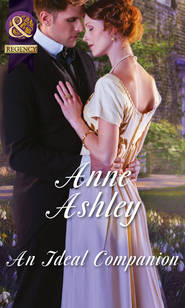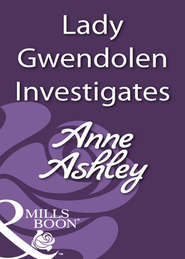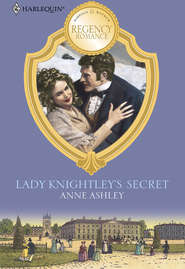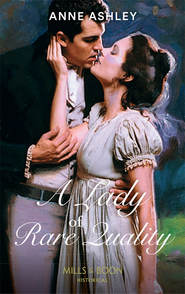По всем вопросам обращайтесь на: info@litportal.ru
(©) 2003-2024.
✖
Miss In A Man's World
Настройки чтения
Размер шрифта
Высота строк
Поля
‘Now that’s an interesting proposition.’ Lord Fincham beckoned with one finger. ‘How much are you worth, Georgie?’
When blue eyes regarded him in a mixture of outrage and disgust, he came perilously close to dissolving into laughter, but was spared any further attacks on his powers of self-control by the arrival of the hostess.
Fincham rose at once to his feet. ‘Your arrival is most timely, your Grace. Sir Willoughby here has lost complete interest in our game. Perhaps you could provide him with another opponent more worthy of his skill?’
‘I very much doubt that, Fincham,’ she responded. ‘Your reputation is widely known. There are few here tonight who would pit their skill against one of the favoured five.’ Her smile faded slightly. ‘Or perhaps it would be more accurate now to say … the favoured four.’
His lordship didn’t attempt to respond to this. After exchanging a few other brief pleasantries with their hostess, he turned to leave and caught an almost frozen look on the face of his page. So deeply entrenched in her own private world did she appear to be that it took two attempts before he could gain her attention and instruct her to follow him from the room.
Putting her sudden disinclination to talk down to the lateness of the hour, and fatigue, he didn’t attempt to make conversation until he had taken leave of the host, and had led the way outside to where his carriage stood awaiting him.
‘Get in, Georgie,’ he ordered, so far forgetting himself as to open the door for her. ‘I shall not be returning to Berkeley Square with you.’ He then turned to his head groom, perched high on the box. ‘I entrust it to you to take care of my page, Perkins. I shall make my own way home in the morning.’ And with that he sauntered off down the road, leaving both his servants to stare after him.
‘But why isn’t he coming with us? Where’s he going, do you suppose?’ a bewildered little voice enquired.
The head groom looked down, askance, at the slight figure by the roadside. ‘Cor blimey, lad. Green by name and green by nature, that’s you! He’s going to pay a visit to his mistress, o’ course! He won’t be getting much sleep tonight, if I knows anything. But I needs mine, so climb aboard and let’s get going!’
The instruction was obeyed, but a moment later the carriage door was slammed shut with considerable violence.
Chapter Three
The following morning Brindle located his quarry with no difficulty whatsoever. Seated at the kitchen table, the page was lending Cook a helping hand as usual, although for some reason seeming less sociable than usual. He didn’t perceive anything untoward in this slightly subdued state. The child had not gone to bed until the early hours, and was no doubt feeling slightly out of spirits through lack of sleep.
‘His lordship has returned to the house, Mrs Willard, and requires breakfast as soon as maybe. He will partake of it in the breakfast parlour and desires you, George, to serve him.’
As this was an undoubted honour bestowed upon one so young and inexperienced, the response was not quite what the butler might have expected.
‘Oh, he does, does he!’ Looking decidedly mutinous, the page rose abruptly from the chair, very nearly toppling it over in the process. ‘Well, he can damn well serve it himself, because I’m going out! Come, Ronan!’
It would have been difficult to say which member of the staff present was most shocked by the outburst. Both the scullery maid and the boots stared open-mouthed as the door leading to the mews was slammed shut by the clearly disgruntled young servant. Even Mrs Willard appeared taken aback by the outburst.
‘Well, upon my soul! There’s heat for you, Mr Brindle!’ Cook declared, when she’d recovered from the shock. ‘Have you ever heard the like before? Anyone might suppose the boy doesn’t know his place.’
‘And there you have hit upon it exactly, Mrs Willard, because I do not believe he does know his place!’ Napes announced, having entered the kitchen in time to witness the shocking outburst. ‘And he should be made to learn it! It’s no good, Mr Brindle,’ he continued. ‘I know you look kindly upon the boy, and have from the first, but behaviour of that sort cannot go unpunished. His lordship should be told about this appalling breach of conduct.’
‘But not by you, Mr Napes,’ the butler countered. ‘Kindly remember I am in charge here; I shall decide how best to deal with the matter.’
In truth, the highly skilled and diligent major-domo was in something of a quandary. He was fully aware that it was essential to maintain discipline and standards below stairs at all times, otherwise his authority would quickly be called into question. Yet, at the same time, the valet had been so right: he had developed a genuine fondness for his latest protégé.
Only the day before the boy had joined him at the table, without being instructed to do so, and had helped polish the silver. He had performed the task well. But, then, everything the child attempted he did well, Brindle reminded himself. The page’s culinary skills were quite remarkable in one so young. Even Cook had said he would make a fine chef if he were ever to apply himself. From the first he had proved himself to be willing and able, and so cheerful for the most part. Yet, today, for some reason.
Undecided how best to deal with the matter, Brindle gave instructions for the selection of breakfast dishes, once prepared, to be conveyed to the small back parlour, and was in the act of arranging them carefully on the side table himself when his lordship entered.
‘Where’s Georgie? Not still abed, I trust?’
After signalling the footman and parlour maid to leave the room, Brindle poured his lordship coffee. ‘No, sir. But he hasn’t—er—returned to the house yet. He’s taken the dog for his customary morning walk.’
‘I see. In that case tell him I wish to see him in the library, when he does return.’
A moment’s silence followed, then, ‘I’ll endeavour to do my poor best, my lord.’
It was over an hour later when the errant page finally put in an appearance. One glance at those delicate features, set in a mutinous glower, was enough to convince the Viscount that all was far from well, and that was even before he received a terse verbal confirmation.
‘Well, you wanted to see me, so here I am!’
After very slowly returning his quill to the standish, his lordship gave his full attention to the slender figure still clasping the handle of the door. Naturally enough he was not accustomed to being addressed in such a manner, most especially by a member of his own household; and although it would be true to say he didn’t seem able to bring himself to look upon the girl as a servant, he felt it was incumbent upon him to attempt to maintain the status quo.
‘I believe I warned you before that I’m not above taking a birch rod to impertinent children,’ he said, oh, so very quietly. ‘I shall not remind you of it a third time, Georgie. So, for your own continued comfort, I would suggest you close the door, come over here and tell me what has put your nose out of joint.’
At least part of the advice was heeded. She did, after a moment or two, close the door and slowly approach the desk, but remained stubbornly silent. A less tolerant man might have lost his patience at this point. His lordship, however, out of consideration for her sex, was determined to maintain a calm authority.
‘And I’m still awaiting an explanation,’ he reminded her gently.
If anything the mutinous expression became more marked before she finally unlocked tightly compressed lips to say, ‘The only reason I’m here is because I wish to make it perfectly plain that it wasn’t Brindle’s fault that I didn’t attend you at breakfast. So you mustn’t blame him. He passed on your message, but … but I was in a bad mood, and so went out.’
His lordship sighed heavily when she volunteered nothing further. ‘We progress, but not very rapidly. Might I be permitted to know why you awoke in such a bad humour? You seemed happy enough last night when I left you.’
When she lowered her eyes and stared steadfastly down somewhere in the region of the standish on his desk, he began to fear he’d learn little else without resorting to coercion. ‘Did something occur on the homeward journey to upset you?’ he asked, grasping at straws. Then a clear memory returned, and he recalled she had seemed rather subdued, after his meeting with a decidedly flamboyant baronet. ‘It wasn’t Sir Willoughby Trent’s nonsensical suggestion about selling you to him that upset you, was it?’
It took a few moments but eventually blue eyes did meet his above the desk for a few brief moments. ‘Well, it wasn’t very nice, was it?’
‘No, it wasn’t very nice,’ he agreed, ‘besides being totally ludicrous. I do not own you, Georgie, you are not my slave. You are free to leave my employ whenever you wish.’
A further moment’s silence, then, ‘Well, that’s all right, then. We need not dwell on the matter any more.’
Although her eyes had once again met his fleetingly as she had said this, it had offered opportunity enough to glimpse an almost calculating look lurking in those violet depths that had given him every reason to suppose the artful little madam had made use of his suggestion about Sir Willoughby’s remarks in order to conceal the source of her true ill humour. He decided, however, not to persevere, and with a complete change of subject asked if she could ride.
She didn’t attempt to hide her surprise. ‘Well, of course I can ride!’
‘In that case you may send word to the stables to have my bay and the chestnut saddled and awaiting us in the Square in fifteen minutes.’
‘Can you make it twenty, my lord?’ she asked, pausing at the door. ‘I must seek out Brindle and apologise to him for my behaviour earlier.’
‘Do not consider me for a moment, child,’ he responded with gentle irony. ‘I shall quite naturally await your convenience.’
It was only by dint of tapping into those deep reserves of self-control that prevented his lordship from bursting into laughter when, half an hour later, they left the house together in order to set off for their ride. She took one look at the chestnut gelding, held securely in the groom’s hand, and her jaw dropped perceptibly as she muttered loud enough for him to hear, ‘Oh, my, I never thought of that!’
He realised at once that it wasn’t so much the horse as the saddle that had brought about mild consternation on her part. Unfortunately, unless he wished to give rise to a deal of gossip and speculation about her, which he had done his utmost to avoid thus far, he could hardly startle the groom by demanding a side-saddle be put on the chestnut. Sensible girl that she was, she quickly realised this herself, and mounted the gelding without further ado and, more importantly, without requesting assistance.
By the time they had ridden out of the Square, Lord Fincham was convinced she was well on the way to mastering the foreign saddle. By the time they had reached Hyde Park, he was satisfied she was an extremely competent horsewoman, possessed of a fine seat and a gentle pair of hands. All the same, he veered on the side of caution and decided to keep to the less crowded areas of the park so that she might enjoy the exercise without having to concentrate on avoiding other riders and the numerous open carriages that filed into the park at, this, the most fashionable hour to be seen abroad. Besides which, he thought it was time to discover a little more about her if he could.
He began with what he considered a fairly safe gambit, and one that wasn’t likely to arouse suspicion. ‘You ride very well, Georgie, my boy. Who taught you?’
‘My godfather, sir,’ she answered promptly enough. Then, smiling faintly, ‘He was lucky enough to keep a horse or two.’
‘Is that so?’ He considered her for a moment in silence. ‘Forgive me if I am in error, Georgie, but I gained the impression from something you said that there was no one responsible for you.’
‘No, you are not wrong, my lord.’ She never attempted to look at him, but continued to stare straight ahead between the chestnut’s ears. ‘My godfather died earlier this year.’











